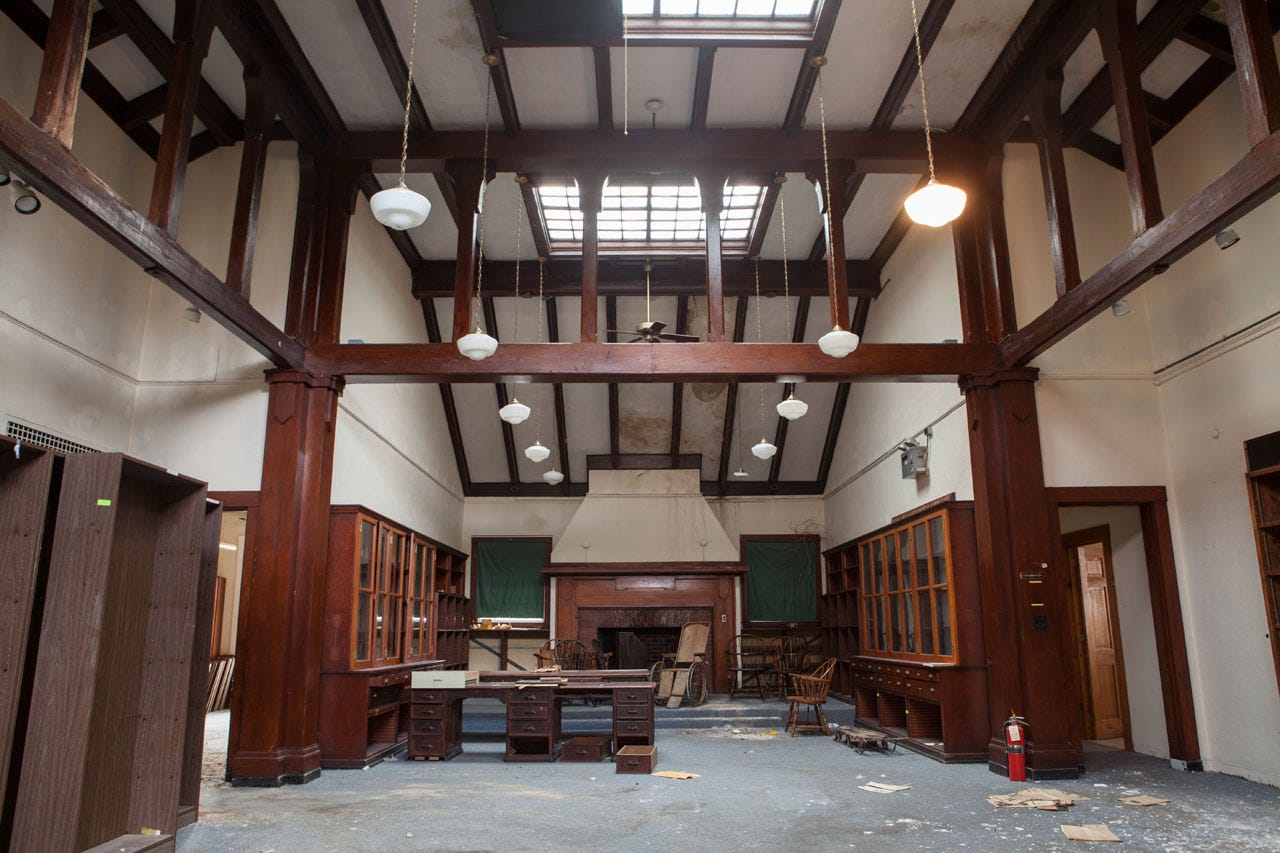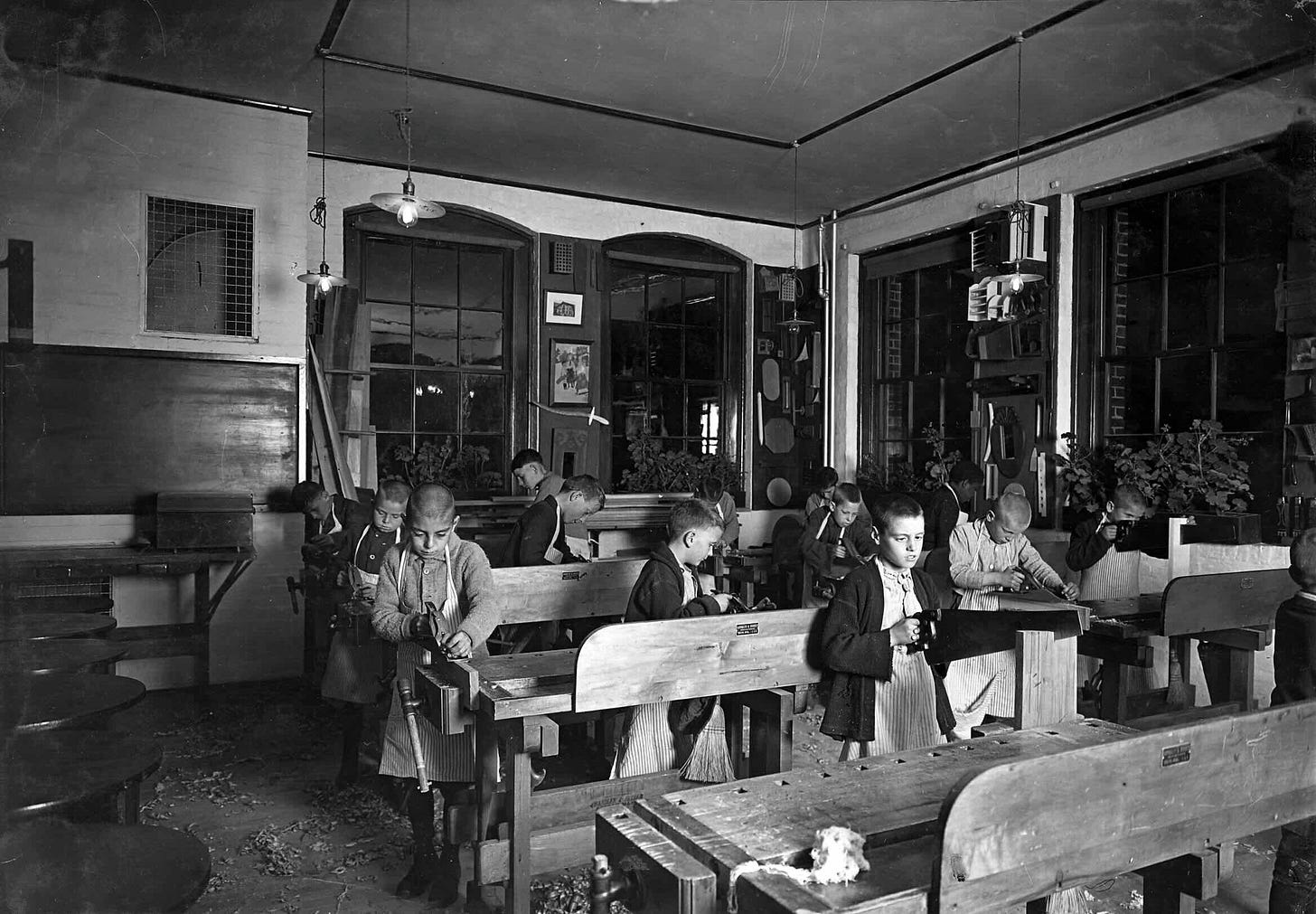Announcing (Un)Hidden: Disability Histories and Our World
A new bi-weekly series of articles, interviews, and explorations into the history of disability
In late fall 2014, I stood in the doorway of an abandoned library and crouched down to pick a small black cardboard box off the ground. Inside were heavy glass slides from the mid-20th century, each one depicting a terrarium of nerve cells in the brain. But one was different. It was a black and white photograph of a man standing in profile, naked, his back curved like a giant S, his sad eyes looking off in the direction of someone unseen.
This was what remained of the Howe Library, which was once the world’s largest repository of books and documents relating to intellectual and developmental disabilities. The collection was started by Walter E. Fernald (1887-1924), a mysterious figure whose institution was all that was left to carry his name into the present day.
After 166 years, the Fernald School was closing and I wanted to know how it had started, because when it opened in 1848 under Fernald’s predecessor, Samuel Gridley Howe, it was the first public institution for the education of intellectually and developmentally disabled people in the western hemisphere.
Who had thought, in 1848, that disabled people were worth society’s time and effort? What did their methods look like? What was it like to be disabled in the 19th century? How did it change when the now-forgotten Fernald arrived in 1887 and brought the school from Boston to its campus in Waltham, Massachusetts?
The library at the heart of Fernald’s campus would have been the place to look for answers.
It had once housed all of Walter Fernald’s correspondence along with the papers of Gunnar and Rosemary Dybwad—the couple who created our legal conceptions of disability human rights—and Irving Zola, who gave us many of the frameworks we use to this day to think about disability. In its heyday, the library was a global destination. There were books, slides, patient records and more.
But I was already in mourning at the thought that almost all of it had been destroyed. I was told the sorrowful story that dumpsters full of documents were thrown away when the state scrambled to depart the sprawling 196-acre institution, and I knew that tens of thousands of other documents had been left behind in the dozens of other buildings, all for vandals to grab at whim.
I was told that anything that had survived the purge would be found at the Massachusetts Archives, a fortress along Boston Harbor where the state stores records, artifacts and documents going back centuries. When I arrived, I approached the reference desk and asked the archivist if they had even a few boxes left from Walter Fernald’s administrative correspondence.
“You’re going to have to be more specific,” she replied. “We have dozens of boxes of Walter Fernald’s correspondence and hundreds of boxes of patient files and other material from the state schools. But I should warn you. Dr. Fernald’s papers are completely out of order. Every page is from a different day, month, and year. It is impossible to make sense of any of it, and much of it is restricted due to privacy.”
Ten years have passed since that day. I have reviewed a quarter million pages of documents from the collection, painstakingly reconstructing portions of it in their original order. I have traveled to archives, museums, cemeteries, and abandoned institutions across the United States and abroad. Along the way, I’ve located other parts of the Howe Library that were salvaged and I’ve interviewed countless fellow disabled people, former institutional employees, activists, and historians, all in search of a fuller understanding of how we came to think and talk about disabilities the way we do today.
Next year, I will publish a biography of Walter Fernald based on my research. A Perfect Turmoil: Walter E. Fernald and the Struggle to Care for America’s Disabled tells the story of the man who created our modern system of special education, the diagnostic methods that doctors and social workers use, and the rise of psychology as we know it. Walter Fernald, it turns out, was the leading figure in the world in this work. In telling his story, I have also tried to tell the hidden story of the mass persecution of disabled people in America in the 19th and 20th centuries up to today.
I wrote the book as a non-academic work, and I want it to be something that people can read with ease. But as much effort as the book took to write, there is so much more. I’ve now encountered and uncovered a universe of other stories that shape the way I look at everything around me. Each day that passes, I find more, and I would like to invite you along to share in that discovery.
That’s why I’ve created (Un)Hidden: Disability Histories and Our World, a bi-weekly in-depth series of articles, interviews, and explorations drawn from my work. Along the way, I will share news and updates in the lead-up to the publication of the book.
I firmly believe that this history can help us understand things we see in the present day, from the ways that disabled people live our lives to the ways that we’re prevented from doing so, and everything in between. If you’re receiving this as an email, I’ve included you because I think you have interest in this material, but if this is something you’d rather not receive, please feel free to unsubscribe.
If you do want to continue to receive it, you don’t have to do anything at all and new material will show up every two weeks for your Sunday morning reading.
If this somewhat dour subject deeply excites you, please share and ask others to sign up; and consider a donation to support this work. Aside from a modest stipend from Brandeis University and the occasional payment for articles I’ve written, I have self-funded all this work for the last decade and your support will allow me to keep at it more fully than ever.
We are all looking to understand this life just a little bit more, and I hope these dispatches will share the ways that disability—a subject we too often avoid discussing—has pride of place in all of it.
- Alex Green | Waltham, Mass.
*Thanks to John Loeppky, who has provided editorial wisdom for the forthcoming editions of this email.







